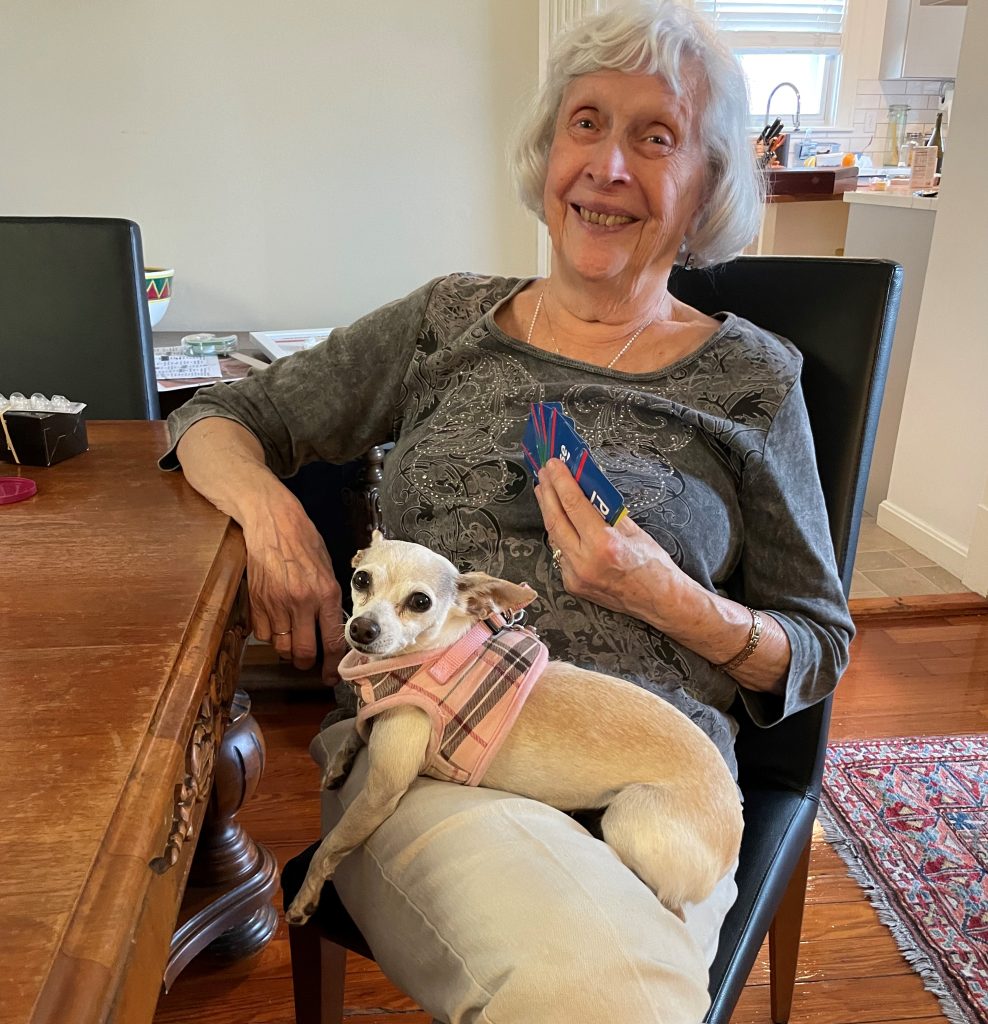
Moving Mom into Assisted Living was a Big Lift
Planning the Normandy invasion seems like a good comparison with the layers of logistics, to-do lists, emails, phone calls, and documentation required to move my mother from her Orlando-area home to assisted living near Boston, where I live.
She was understandably reluctant to leave her home of 30-plus years. But I’m luckier than many baby boomers because elderly parents often refuse to move out. Mom liked the idea of having people in assisted living who would cook and clean for her and do her laundry.
But what I believe finally convinced her that relocating was the best option were two hospital stays within 10 days last March in Orlando for two newly diagnosed conditions. I think she realized I could take better care of her if I didn’t have to fly down for every emergency.

The months of planning were only one aspect of mom’s move in June to assisted living in Somerville, next door to Boston. It was an enormous responsibility to yank her out of her warm Florida climes where her memories of my father reside, along with Wednesday bowling and Friday night bridge at the clubhouse.
Would she like living here? Could she still make friends at age 87? Would she refuse to go outdoors when the temperature dips below 65?
Answers to these questions are still pending in September. She has the advantage of having had a crash course in relocating and making friends in the 1950s and 1960s as the young wife of a U.S. Air Force pilot who moved his family from flight training in South Carolina to posts in Japan, Mississippi, Maine, Texas and the Chicago area.
“I’m good at moving,” mom declared, as though convincing herself the move would be okay. And yet, finding what she calls her “new best friend” at assisted living has been slow-going. We will see.
For me, this project – choosing the Boston area over Orlando, finding the right facility, figuring out whether she could afford it, packing up a life’s worth of stuff, lining up new doctors, coordinating with a new pharmacy, and the logistics of moving – is surely one of the hardest things I’ve ever taken on.
First was the finding. We started out looking at independent living facilities in both Boston and Orlando. Mom probably would’ve been fine in independent living now, but I started to worry that, at her advanced age, she would need a lot more help in two or three years. Rather than move her again as her health declined, we decided assisted living made more sense.
During the three months we were investigating various facilities, I was in the throes of indecision between Orlando and Boston. Whether to move her at all was one consideration but cost was equally important for my barely middle-class mother with $3,300 in monthly pension income and the money she withdraws from her limited retirement savings. The assisted living facilities in the Orlando area are generally fancier and less expensive than Boston’s with more amenities like a van to drive retirees to Target and occasionally singers or others hired to entertain the residents.
But after flying her up to Boston last winter, we decided on a non-profit assisted living facility here. It’s bare bones – no van to shuttle residents around and, as a result, affordable by Boston’s standards at $5,300 a month. Other pluses were that all the apartments have a separate bedroom – no studios – and she didn’t have to pay a lump sum to “buy in.” This arrangement seems fairly common in high-priced Boston but would deplete her savings. The non-profit also had an amenity that appealed to my mother: a regular 6 p.m. card game.
Everything seemed settled – until it wasn’t. Although the staff had assured mom that she would be able to bring Luna, her 7-pound chihuahua and constant companion, I woke up one morning to an email saying the policy had changed: no dogs. I pointed out that they’d already promised she could bring Luna, that she refused to move in without her, and that we’d spent thousands of dollars on a new couch and bed, which was a welcome requirement to prevent new residents from transporting bed bugs to the facility.
That began a white-knuckled weekend wondering what we would do now. I was very relieved when the woman who sold us on the facility persuaded her boss to grandfather Luna in. This incident had a happy ending too because mom’s neighbors love the dog. She makes them smile, and I’d say she’s a net positive for the elderly and people with disabilities living there.
Packing up was a nightmare. I repeatedly had to remind mom that she was moving into a 550-square-foot apartment. I drew furniture onto a schematic of the floor plan to prove that her sectional couch wouldn’t fit and that she couldn’t take her dining room table and chairs. She was determined to pack up as many of the tchotchkes, wall hangings, and photographs in her three-bedroom, two-bathroom house as possible. I and a woman who came every Thursday to cook for her in Orlando successfully stopped her from putting some items in boxes.
But when I left Orlando in May to see a doctor in Boston and attend a wedding in Los Angeles, mom sneaked more of her things into boxes. In her new apartment, the surface of every table, dresser, nightstand, shelf, and counter is full. The logistics of hiring and organizing the movers was another challenge, but my brother and husband largely managed that.
Relocating an elderly parent 1,300 miles also requires finding all new doctors. I latched on to a gerontologist next door in Cambridge, Mass., as her primary care doctor. Now we’re making the rounds to a cardiologist and pacemaker clinic, an ear doctor, cognitive therapist, orthopedist, sleep clinic, and dentist.
There is definitely one big benefit to assisted living: I no longer have to remind mom to take her medications or worry that she’s forgotten. The aides deliver them to her each morning and night. The pharmacist even communicates directly with the doctor and delivers the pills to the facility, so I no longer have to call CVS to renew prescriptions. That’s a big time saver.
In Mom’s fourth month in assisted living, my fear has proved true: it’s not easy for an 87-year-old to relocate. She hasn’t made the same kind of connections she has with her few remaining friends in Orlando. But we did find a Presbyterian church around the corner and a bowling league for retirees in Somerville. She enjoys trying to get the hang of our quirky local brand of candlepin bowling.
I recently got the best indication that this big move just might work out. She has been visiting my brother in Chicago, where she had looked forward to spending time with her grandchildren and great granddaughters. But there’s not much to do while everyone is working.
During a phone conversation, she seemed to miss being able to walk down the hall to socialize at meal times or play one of the organized games at assisted living.
“I’m ready to come home,” she said. I consider that a small victory.
Squared Away writer Kim Blanton invites you to follow us on Twitter @SquaredAwayBC. To stay current on our blog, please join our free email list. You’ll receive just one email each week – with links to the two new posts for that week – when you sign up here. This blog is supported by the Center for Retirement Research at Boston College.
Comments are closed.







I had a friend who I helped move at 92. She knew it was time and so we planned it well. We would always check out a place at lunchtime to test the food! She lived to 99 and enjoyed her years at Assisted Living. Miss her.
Kimberly, I feel your pain … only mine is in the past. My mom passed several years ago after spending almost 10 years at a non-profit assisted living facility in Chicago. Oh my gosh, helping an elderly parent manage life as she ages is truly a full-time job and full of emotional challenges! So I wonder, how do folks without diligent, caring children manage all this? And does the complexity of the health care system in this country only add to the burden? Also, based on my experience, I would choose a non-profit over a profit-making facility any day. For-profit systems owned, many times, by off-site private equity firms, have flashy amenities but short-change residents on other things, like staffing. And staff members are often frustrated by the fact that they are not providing the kind of care they know they could if profits weren’t top priority. At least that is my experience. This goes for rehab centers too. Wishing you and your mom the best!
This is very similar to my experience with my own Mom. Your story resonates.
I moved two mothers: mine and my wife’s, both about a year apart. Neither one was easy, not even the one from Brooklyn, NY to Middletown, NJ. My mom had dementia and relocating to Florida where my brother and sister-in-law moved her to assisted living was just as stressful.
My advice to you is simple. Your mom will be /is grieving the loss of her life in Florida. So be alert to the signs and her feelings. Give Luna a pet for me.
I can so relate. I moved my dad from Hawaii to California after he had a stroke. We tried independent living, but he fell and ended up going to a memory care unit because doctor wrote he had dementia whereas mild cognitive impairment was probably more accurate. He was able to move into a nice facility just a two minute drive away, and a 7 minute walk from my house! I advise caregivers to also consider what works for them, too, and it’s ok. I could have found a less expensive place, but having him so close allowed for me to easily visit him on my way to or from work, pick him up for doctor’s appointments or bring him over to my house for dinner.
I helped my mother to move from Cali to Nebraska. I wanted to pack by myself but had to book movers. It was easy but kind of expensive